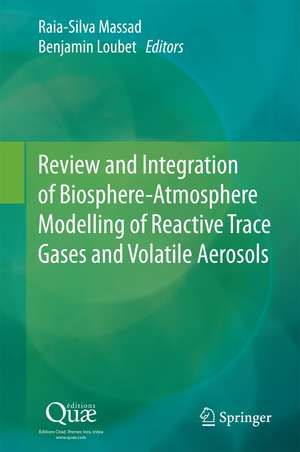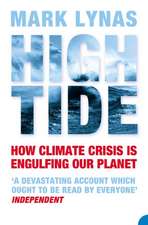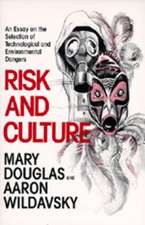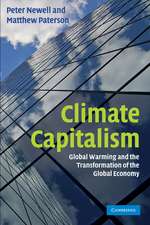Review and Integration of Biosphere-Atmosphere Modelling of Reactive Trace Gases and Volatile Aerosols
Editat de Raia Silvia Massad, Benjamin Loubeten Limba Engleză Hardback – 30 iul 2015
| Toate formatele și edițiile | Preț | Express |
|---|---|---|
| Paperback (1) | 555.72 lei 39-44 zile | |
| SPRINGER NETHERLANDS – 23 oct 2016 | 555.72 lei 39-44 zile | |
| Hardback (1) | 573.52 lei 39-44 zile | |
| SPRINGER NETHERLANDS – 30 iul 2015 | 573.52 lei 39-44 zile |
Preț: 573.52 lei
Preț vechi: 716.90 lei
-20% Nou
Puncte Express: 860
Preț estimativ în valută:
109.74€ • 119.69$ • 92.54£
109.74€ • 119.69$ • 92.54£
Carte tipărită la comandă
Livrare economică 21-26 aprilie
Preluare comenzi: 021 569.72.76
Specificații
ISBN-13: 9789401772846
ISBN-10: 9401772843
Pagini: 180
Ilustrații: IX, 235 p. 26 illus., 18 illus. in color.
Dimensiuni: 155 x 235 x 2 mm
Greutate: 0.63 kg
Ediția:1st ed. 2015
Editura: SPRINGER NETHERLANDS
Colecția Springer
Locul publicării:Dordrecht, Netherlands
ISBN-10: 9401772843
Pagini: 180
Ilustrații: IX, 235 p. 26 illus., 18 illus. in color.
Dimensiuni: 155 x 235 x 2 mm
Greutate: 0.63 kg
Ediția:1st ed. 2015
Editura: SPRINGER NETHERLANDS
Colecția Springer
Locul publicării:Dordrecht, Netherlands
Public țintă
ResearchCuprins
Introduction.- Organisation and structure of the workshop.- Section I: Review documents.- Advances in understanding, models and parameterisations of biosphere-atmosphere ammonia exchange.- Modelling atmosphere-biosphere exchange of Ozone and Nitrogen oxides.- Bidirectional exchange of volatile organic compounds.- Surface / atmosphere exchange of atmospheric acids and aerosols, including the effect and model treatment of chemical interactions.- Section II: Synthesis according to compounds.- Modelling the air-surface exchange of ammonia from the field to global scale.- O3 and NOx exchange.- Bi-directional exchange of volatile organic compounds.- Aerosol and Acid Gases.- Section III: Synthesis according to model component.- Gaseous stomatal exchange and relation to ecosystem functioning.- Impact of leaf surface and in-canopy air chemistry on the ecosystem/atmosphere exchange of atmospheric pollutants.- Soil and litter exchange of reactive trace gases.- In-canopy turbulence - State of the art and potential improvements.- A common conceptual modelling framework for reactive trace gases and volatile aerosols atmosphere-biosphere exchange in chemical transport models.- General model requirements.- The ideal model for each compound.- Ammonia.- Nitrogen oxides and ozone.- Aerosol and acid gases.- Volatile organic compounds (VOC).- Emerging common features in the modelling framework.- Acknowledgements.
Textul de pe ultima copertă
When considering biosphere–atmosphere exchange of trace gases and volatile aerosols, significant advances have been made both from an experimental and modelling point of view and on several scales. This was particularly stimulated by the availability of new datasets generated from improvements in analytical methods and flux measurement techniques.
Recent research advances allow us, not only to identify major mechanisms and factors affecting the exchanges between the biosphere and the atmosphere, but also to recognize several gaps in the methodologies used in accounting for emissions and deposition in landscape and global scale models.
This work aims at (i) reviewing exchange processes and modelling schemes, parameterisations and datasets, (ii) presenting a common conceptual framework to model soil-vegetation-atmosphere exchange of reactive trace gases and aerosols accounting for in-canopy transfer chemical interactions and (iii) discussing the key elements of the agreed framework.
Recent research advances allow us, not only to identify major mechanisms and factors affecting the exchanges between the biosphere and the atmosphere, but also to recognize several gaps in the methodologies used in accounting for emissions and deposition in landscape and global scale models.
This work aims at (i) reviewing exchange processes and modelling schemes, parameterisations and datasets, (ii) presenting a common conceptual framework to model soil-vegetation-atmosphere exchange of reactive trace gases and aerosols accounting for in-canopy transfer chemical interactions and (iii) discussing the key elements of the agreed framework.
Caracteristici
Explains the current state of knowledge on biosphere-atmosphere exchange of trace gases and volatile aerosols Offers a collection of scientific papers summarising the key issues associated with biosphere atmosphere exchange exchanges Suggests approaches to developing a new modelling framework for biosphere atmosphere exchanges Includes supplementary material: sn.pub/extras








